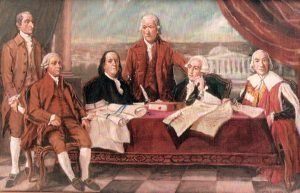As the Brexit negotiations grind on, you frequently hear apologists for the EU claim that the EU has to be intransigent and "punish" the UK for leaving, to deter other members from leaving.
Brits tend to be bewildered at this attitude, because Britain has never taken the "revenge" route when dealing with it's former empire.
The first country to leave the Empire was of course the United States. The American revolutionary war lasted eight grim years from 1775 to 1783. In theory the British should have defeated the Americans easily - but the Americans had help from two countries that hated Britain: the French and Spanish.
France famously went into debt to the tune of 1 billion livres, to help the Americans, providing both ships to thwart the British supply ships, and soldiers to fight alongside the Americans. The goal of the French was to weaken Britain, and perhaps to regain the territories they had lost in the Seven Years War, which included Quebec.
Spain provided informal aid to the Americans in the form of gold, from 1776 to 1778 and formally declared war on the UK in 1779, which allowed them to help the Americans in the siege of Yorktown, and to repel attacks in Louisiana. Spain then marched through Illinois and took Fort St George in Michigan. This they hoped, would give them a claim on the NorthWest Territory.
By the time the war had ended, both France and Spain felt they were in a strong position in the peace negotiations that took place in Paris in 1783.
How did Britain react to the humiliation of losing the war to the USA (and France and Spain)? Lord North, the Prime Minister, resigned. He was replaced by Lord Shelburne, a shrewd and far-sighted man.
He had no thoughts of revenge at all. It certainly never occured to him to "punish" the Americans in order to deter other colonies (Canada, Australia, etc) from leaving the Empire. His goal was to ensure that there was as little damage to Britain and the USA as possible in the peace.
The French proposed a deal that would confine the Americans to the land east of the Appalacians, give Britain the land north of the Ohio and the Spanish would take everything south of the Ohio.
Lord Shelburne invited the Americans for secret talks prior to the negotiations in Paris, and the Americans accepted because they were unhappy with the French proposals, so much so that they told Lord Shelburne they were willing to negotiate directly and cut out the French and Spanish.
Britain then formally acknowledged that the Americans owned all the lands south of the Great Lakes and east of the Mississippi river, making the Americans a gift of the vast Appalacian territory which more than doubled the size of the USA.
The French were astonished. "They've conceded more land in peace than in war," the French negotiator Vergennes said in disgust.
In addition, Britain gave the Americans fishing rights off the coast of Canada, and the right to trade with Britain without tariffs (as though it was still part of the Empire).

The French and Spanish thought Britain had gone mad (they would not have behaved the same way, and this was borne out when some of their own colonies sued for independence a century later).
Britain hadn't gone mad at all. Lord Shelburne decided that if the USA couldn't be part of the Empire, at least it should be an ally and a trading partner. Above all he wanted to prevent the Americans from being invaded by either Spain or France and the easiest way to do this was to make the USA economically viable so they had the means to defend themselves.
After some initial struggles, the Americans were economically viable, so much so that they were strong enough to come to Britain's aid in 1941 during World War Two. If Lord Shelburne was watching, he'd probably have given a little smile.